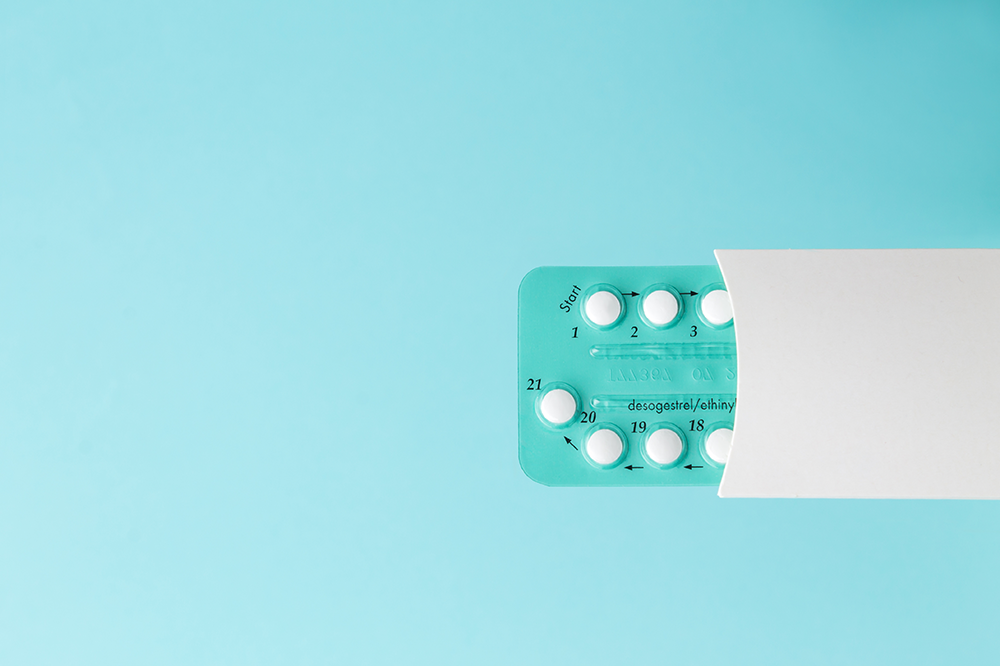The contraceptive pill – often referred to as just ‘the pill’ – is a method of birth control which uses synthetic hormones to prevent pregnancy.
In this article, we’ll look at what you need to know about the contraceptive pill, how to take it, the potential side effects and how you can access it.
What is the contraceptive pill?
If you are sexually active, it is important that you use a consistent method of contraception to avoid getting pregnant.
The contraceptive pill (oral contraception) is one of the most widely recognised and effective methods of birth control, when used correctly.
There are two main forms of the contraception, these are:
- The Combined Pill – This pill consists of two synthetic versions of the female hormones oestrogen and progesterone, which prevent the ovaries from releasing an egg (ovulation).
The pill is primarily taken to prevent pregnancy but may also be prescribed for other conditions, including painful or heavy periods, premenstrual syndrome (PMS) or endometriosis.
When taken correctly, the combined pill is over 99% effective!
- The Progesterone-only Pill – This pill is typically prescribed to women who have a condition which prevents them from taking the combined pill, such as blood clots.
Unlike the combined pill, it doesn’t contain oestrogen and works by thickening mucus in the neck of the womb to prevent sperm entering and can also prevent ovulation.
Again, this form of contraception can be over 99% effective.
How do you start the contraceptive pill?
The majority of women can start taking the pill at any point of their menstrual cycle. There is special guidance if you have recently had a baby, abortion or miscarriage and you should speak to a doctor beforehand if this is the case.
If you start the pill on day one of your cycle (after your last period), you will be protected from the risk of pregnancy straight away. This is usually the case up to the fifth day of your cycle, unless you have a short cycle (i.e. your period is every 23 days or less).
However, if you start the pill on any other day, you may not be protected until you have taken it for at least seven days.
What factors impact the pill’s effectiveness?
When taking any form of medicine, it is important to carefully read and follow the instructions which come in the packet. Missing a direction of use may impact the contraceptive pill’s effectiveness.
Other factors which may reduce the effectiveness include:
- Taking it more than 24 hours late
- Vomiting within two hours of taking the pill
- Some medicines which are used to treat epilepsy, HIV and TB
- Some antibiotics used to treat STIs (sexually transmitted infections)
- Some antidepressants
When you are prescribed other medication, it’s always important to inform your doctor you are taking the combined contraceptive pill so they can make an informed decision on what is best to prescribe you.
What do you do if you miss a pill?
First of all, don’t worry!
If you have missed one pill, take the last pill you missed now (this might mean you take two pills in a day). After this, continue taking the rest of the pills as normal.
If two or more pills have been missed, you should take the last missed pill now (again, this may mean taking two in a day). However, leave any other missed pills and continue the rest of the pack as usual. It is also recommended that you use an additional method of contraception for the next seven days.
If you are concerned about missed pills you can call the clinic for advice on 0300 003 1212 or you can access the missed pill calculator: Missed a Pill? Here’s What To Do Next | The Lowdown
If you had unprotected sex at any point over the previous seven days, you may need emergency contraception.
What are the potential side effects?
When looking into taking the contraceptive pill, it’s important to consider the potential side affects you may experience.
These might include:
- Temporary side effects, such as headaches, nausea, breast tenderness and mood swings, which should go away within a few months
- Increased blood pressure
- Breakthrough bleeding and spotting which is common in the first few months
There are also links to increased risks of thrombosis and breast cancer.
If you are worried about any side effects or need advice, speak to your doctor or get in touch with us today on: 0300 003 1212.
What are other methods of contraception?
In some instances, the contraceptive pill may not be suitable for you. This may be recommended by a medical professional and an alternative form of contraception may be needed.
Condoms are currently the only method of contraception which will prevent sexually transmitted infections (STIs) and pregnancy. They work by catching the sperm and avoiding direct genital contact. Male condoms (external) are 98% effective and female ones (internal) are 95% effective.
If you need free condoms, we can help. Visit https://ec-card.org.uk/ to find out more about our eC-Card and how you can use it to get free condoms.
Long-Acting Reversable Contraceptives (LARC) are a long-lasting contraceptive method which help protect against pregnancy after just one treatment. The most common types are the contraceptive injection, contraceptive implant, intrauterine system (IUS) and intrauterine device (IUD).
For more information and advice on LARC, click here: https://suffolksexualhealthservice.org.uk/larc/.
It is important to note that the pill cannot protect you from STIs. For protection against both STIs and pregnancy you will need to use a condom.
Emergency contraception
Unfortunately, no form of contraception is 100% effective and lapses in protection can happen, potentially leading to an unplanned pregnancy.
Emergency contraception is a method of birth control which is taken after unprotected sex or suspected failure of a regular birth control method, such as the pill or condoms.
Despite there being several types, you will often hear emergency contraception referred to as ‘the morning after pill’.
For more information on emergency contraception, visit: https://suffolksexualhealthservice.org.uk/emergency/.
Accessing the contraceptive pill
It’s understandable to be worried or nervous when considering what contraception to use. It’s important to speak to someone you trust and seek professional advice from the support available.
Most forms of contraception are free in the UK.
Places you can access contraception include:
- GP practices – speak to your GP or a nurse for support or further information
- Sexual health clinics – speak to a member of staff for information about the contraceptives they offer and their STI testing services
Here at Suffolk Sexual Health Service, we can help with contraception, pregnancy tests and termination advice. Contact us on 0300 003 1212 or visit https://suffolksexualhealthservice.org.uk/contact/



